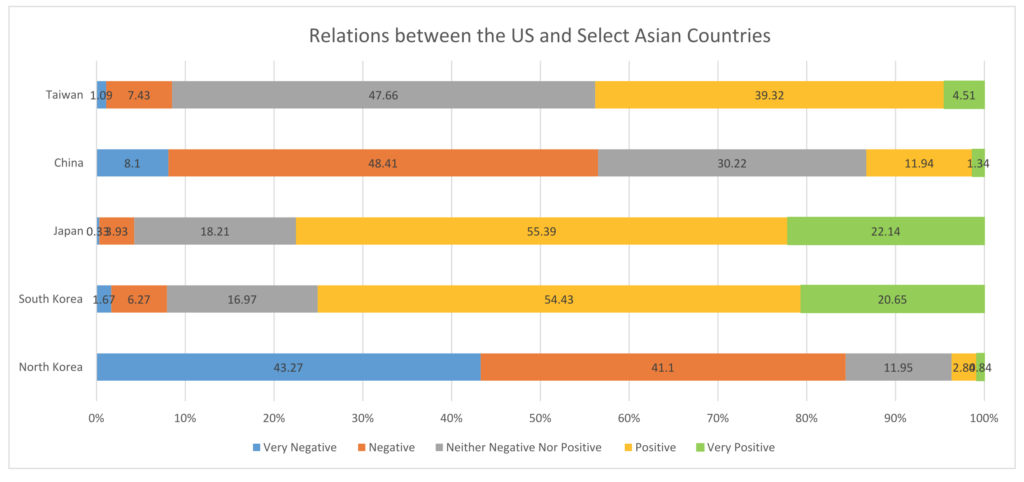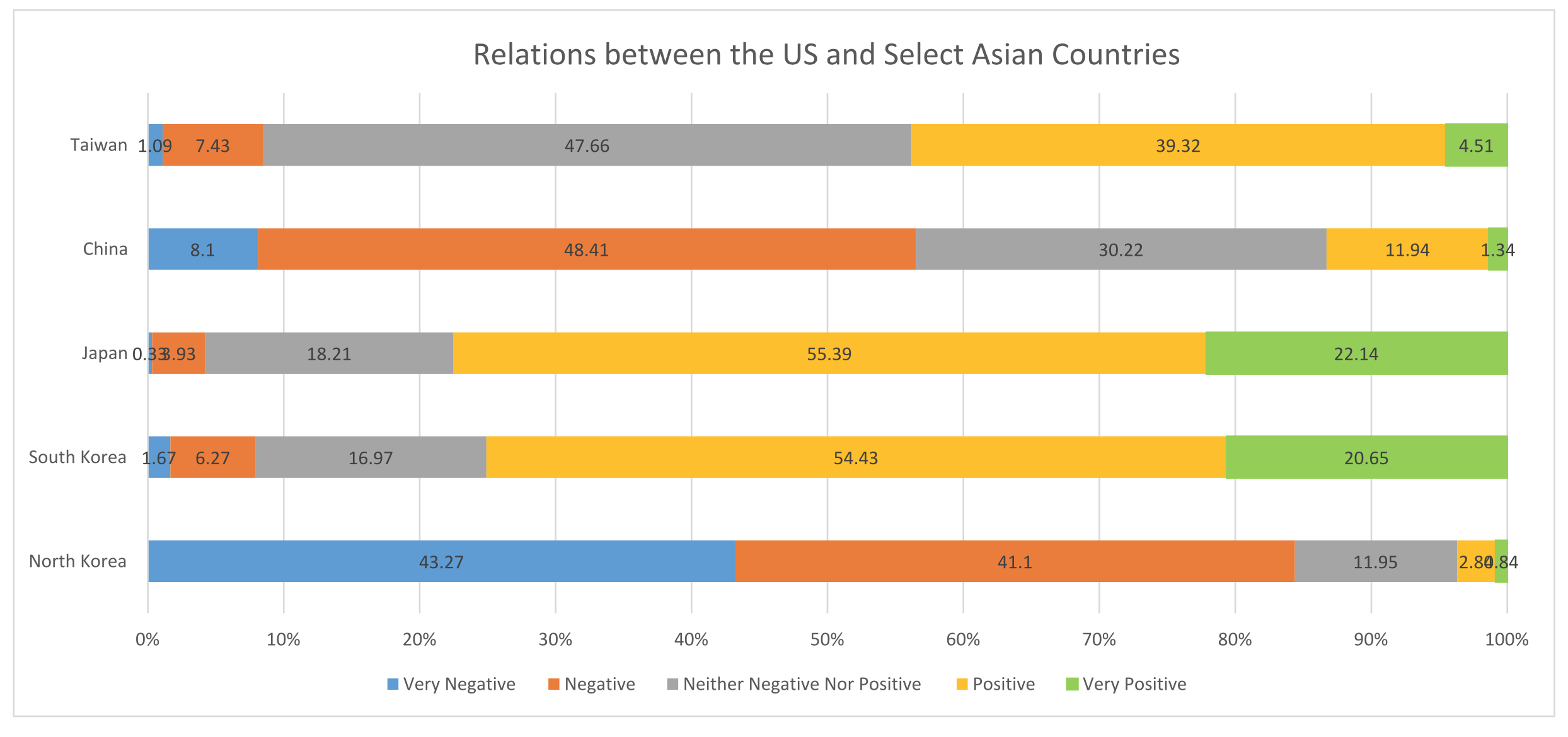American arms sales to Taiwan under the Taiwan Relations Act (TRA) play a crucial role in Taiwan’s defense, but have also remained a point of contention in US-China relations since normalization in 1979. As the only country willing to confront Chinese pressure and sell arms to Taiwan, the United States is the primary provider of the critical armaments Taiwan might need should a military conflict with China develop. As characterized by the Trump administration, the arms sales enhance Taiwan’s capability to deter threats and “strengthen homeland defense.” Yet, it remains unclear whether the American public supports such efforts, especially considering the public’s limited knowledge of Taiwan and concerns about worsening relations with China. For instance, a 2019 Chicago Council on Global Affairs poll found that 61 percent of Americans were against arms sales to the island democracy.
Since 2010, the US has sold over USD $15 billion in armaments to Taiwan. In 2015, a group of Republican lawmakers called on the Obama administration to supply additional arms to Taiwan, with late Senator John McCain arguing that absent supplementary arms, “Taiwan’s military will continue to be under-resourced and unable to make the investments necessary to maintain a credible deterrence across the Strait.” More recently, the Trump administration approved additional arms sales of USD $180 million in May 2020. Chinese officials have claimed that these sales “inflicted further damage to current Sino-US relations.” In response to the sales, China has imposed sanctions, cancelled military exchanges, and penalized the companies that manufactured the armaments.
Despite the potential economic and political ramifications of arms sales to Taiwan, there has been relatively little analysis of American public support for such sales. YouGov, a London based market research and analytics firm specializing in rigorous internet-based public opinion surveys, asked Americans about their perception of Taiwan. In 2017, they found that 44 percent of Americans viewed Taiwan as friendly and 13 percent viewed it as an ally, while 34 percent were unsure, suggesting that the average American has fairly limited knowledge of Taiwan. Our own survey research in March 2020 asking Americans to evaluate relations between the United States and East Asian countries (see the figure below) found that nearly half of respondents rated relations with Taiwan as neither negative nor positive (47.66 percent), higher than any other country in the region. Far more viewed relations with Taiwan positively (43.83 percent) than did negatively (8.52 percent), but this pales in comparison to positive evaluations of relations with South Korea (67.14 percent) or Japan (73.27 percent). Additionally, a 2018 Pew Research Center survey determined that 41 percent of Americans are somewhat concerned about tensions between Taiwan and China, a 3 percent decrease from 2017.

Previous research on Taiwanese public opinion on diplomacy has identified that framing policies as having the potential to harm relations with China can influence support, leading to increased support for formal diplomatic relations, but less support for increasing ties with India. However, little research addresses American public opinion about Taiwan. Our research sought to find if similar framing effects would be present in the US context.
To address US public support for Taiwan, we conducted a web survey involving 1,026 American respondents via mTurk Amazon on July 7, 2020. Respondents were randomly assigned to one of two prompts to evaluate one a five-point Likert scale (strongly disagree to strongly agree). The two prompts read as follows:
Version 1: The US should continue arms sales to Taiwan for its defense.
Version 2: The US should continue arms sales to Taiwan for its defense, even if this harms US relations with China.
The figure below shows the results not only for the overall sample, but also divided by partisan identification. Overall, we see a plurality of respondents were indifferent (answered “neither”) in both Version 1 (44.75 percent) and Version 2 (41.21 percent). Second, we see that support for continued sales (those answering “agree” or “strongly agree”) was 35.21 percent in Version 1, increasing slightly to 38.28 percent when framed in terms of relations with China. In other words, we see that mentioning potential worsening of relations with China only has a marginal influence on increasing support for arms sales to Taiwan.
Moving to partisan identification, we see that 30.5 percent of Democrats supported continuation of arms sales in Version 1, increasing to 35.53 percent when China is referenced (Version 2), yet in both versions, a plurality if not a majority of respondents were indifferent. In contrast, a plurality of Republicans supported arms sales in Version 1 (46.48 percent), with virtually no difference in Version 2 (47.14 percent).
Breaking down support by whether one stated they would vote for Joe Biden or Donald Trump in the 2020 US presidential election produced similar results. For Biden supporters, a plurality were indifferent in Versions 1 (49.65 percent) and 2 (45.1 percent), while support for arms sales increased slightly from 30.07 percent to 33.91 percent. In contrast, a majority of Trump supporters supported arms sales to Taiwan, with nearly identical rates in Version 1 (52.41 percent) and Version 2 (52.17 percent).

The results suggest little public opposition to continued arms sales to Taiwan, even if such sales worsen relations with China. Our findings also show greater support for arms than some surveys, such as the 2019 Chicago Council on Global Affairs. While this may be due to demographic differences in our web survey recruitment, this discrepancy could be in part due to the wording of the survey. Our survey specifically phrases the question as, “the continuation of arms sales”, and tests whether worsening relations with China influences views. Most previous survey research simply refers to selling arms, an act that respondents may not be aware directly relates to Taiwan. However, that a third or more of the public remains indifferent to sales suggests the importance of making a bipartisan case for Taiwan to the American public. This could include emphasizing sympathetic aspects about Taiwan, such as its longstanding relationship with the US, the importance of assisting a fellow democracy, and the extent of the security threat China poses, particularly as a gateway to other US military bases in East Asia. These efforts will be particularly important if arms sales alone are not enough to secure Taiwan’s democracy. For example, the 2019 Chicago Council survey also found that only 38 percent of respondents would support using US troops if China invaded Taiwan, 20 percent lower than if North Korea invaded South Korea. While gauging public opinion of hypothetical situations remains problematic, these differences in support, along with views of US-Taiwan relations compared to American relations with Japan and South Korea, suggest the urgency of improving Taiwan’s image to the American public.
We should also be cognizant of the timing of our survey, in the midst of the COVID-19 pandemic, which originated in China. This has likely—at least temporarily—soured public views on China, which may have limited the effect of framing arms sales as harmful to US relations with China. In other words, concerns of weakening relations with China may be less salient temporarily due to animosity regarding COVID-19. At the very least, the results suggest that the public is not hostile to continued arms sales and that efforts to portray Taiwan as a reliable partner may increase support. However, it is unclear how stable these preferences may be, especially if China responds more aggressively to additional sales beyond rhetorical opposition.
Beyond benefits for Taiwan, arms sales also benefit the United States. The risk of Chinese aggression in the region is ever-present, and Beijing has “made no promise to renounce the use of force” in unifying Taiwan. However, arms sales not only allow Taiwan to defend itself but also allow the United States to defend areas of strategic importance in East Asia. Taiwan’s location adjacent to the South China Sea is of prime military importance to the United States, as Taiwan occupies a key position in the “first island chain.” As such, it is necessary to control Chinese advancements in the event of military conflict. Symbolically, the arms sales agreements also signal US willingness to intervene should China attack first and demonstrate an American commitment to defending democracy abroad and to maintaining even informal diplomatic partnerships. While Republicans historically have shown stronger support for Taiwan, there is an increasingly bipartisan support for aiding in Taiwan’s defense, including the recent arms sales.
The main point: While US arms sales to Taiwan are crucial to American policy in East Asia, there have been relatively few studies assessing US public support for such sales. A new survey has demonstrated that support for continued arms sales is strong, though many Americans remain uninformed or indifferent to Taiwan.




